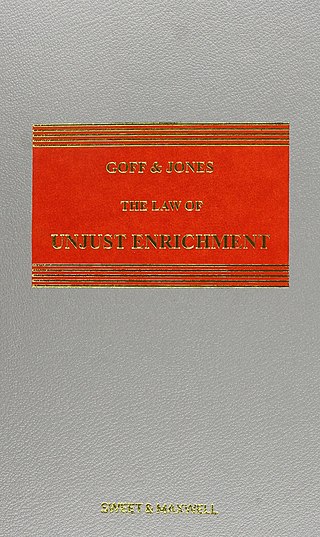At common law, damages are a remedy in the form of a monetary award to be paid to a claimant as compensation for loss or injury. To warrant the award, the claimant must show that a breach of duty has caused foreseeable loss. To be recognised at law, the loss must involve damage to property, or mental or physical injury; pure economic loss is rarely recognised for the award of damages.
Restitution and unjust enrichment is the field of law relating to gains-based recovery. In contrast with damages, restitution is a claim or remedy requiring a defendant to give up benefits wrongfully obtained. Liability for restitution is primarily governed by the "principle of unjust enrichment": A person who has been unjustly enriched at the expense of another is required to make restitution.

Subrogation is the assumption by a third party of another party's legal right to collect debts or damages. It is a legal doctrine whereby one person is entitled to enforce the subsisting or revived rights of another for one's own benefit. A right of subrogation typically arises by operation of law, but can also arise by statute or by agreement. Subrogation is an equitable remedy, having first developed in the English Court of Chancery. It is a familiar feature of common law systems. Analogous doctrines exist in civil law jurisdictions.

English trust law concerns the protection of assets, usually when they are held by one party for another's benefit. Trusts were a creation of the English law of property and obligations, and share a subsequent history with countries across the Commonwealth and the United States. Trusts developed when claimants in property disputes were dissatisfied with the common law courts and petitioned the King for a just and equitable result. On the King's behalf, the Lord Chancellor developed a parallel justice system in the Court of Chancery, commonly referred as equity. Historically, trusts have mostly been used where people have left money in a will, or created family settlements, charities, or some types of business venture. After the Judicature Act 1873, England's courts of equity and common law were merged, and equitable principles took precedence. Today, trusts play an important role in financial investment, especially in unit trusts and in pension trusts. Although people are generally free to set the terms of trusts in any way they like, there is a growing body of legislation to protect beneficiaries or regulate the trust relationship, including the Trustee Act 1925, Trustee Investments Act 1961, Recognition of Trusts Act 1987, Financial Services and Markets Act 2000, Trustee Act 2000, Pensions Act 1995, Pensions Act 2004 and Charities Act 2011.

English contract law is the body of law that regulates legally binding agreements in England and Wales. With its roots in the lex mercatoria and the activism of the judiciary during the Industrial Revolution, it shares a heritage with countries across the Commonwealth, from membership in the European Union, continuing membership in Unidroit, and to a lesser extent the United States. Any agreement that is enforceable in court is a contract. A contract is a voluntary obligation, contrasting to the duty to not violate others rights in tort or unjust enrichment. English law places a high value on ensuring people have truly consented to the deals that bind them in court, so long as they comply with statutory and human rights.

Bristol and West Building Society v Mothew [1996] EWCA Civ 533 is a leading English fiduciary law and professional negligence case, concerning a solicitor's duty of care and skill, and the nature of fiduciary duties. The case is globally cited for its definition of a fiduciary and the circumstances in which a fiduciary relationship arises.
Charles Christopher James Mitchell KC (Hon) is a British legal scholar acknowledged as one of the leading common-law experts on the English law of restitution of unjust enrichment and the law of trusts. He is the author of two leading textbooks and one practitioner's book. He is currently Professor of Law at University College London and Senior Associate Research Fellow at the Institute of Advanced Legal Studies.
The English law of unjust enrichment is part of the English law of obligations, along with the law of contract, tort, and trusts. The law of unjust enrichment deals with circumstances in which one person is required to make restitution of a benefit acquired at the expense of another in circumstances which are unjust.

Lipkin Gorman v Karpnale Ltd[1988] UKHL 12 is a foundational English unjust enrichment case. The House of Lords unanimously established that the basis of an action for money had and received is the principle of unjust enrichment, and that an award of restitution is subject to a defence of change of position. This secured unjust enrichment as the third pillar in English law of the law of obligations, along with contract and tort. It has been called a landmark decision.

Attorney General v Blake[2000] UKHL 45, [2001] 1 AC 268 is a leading English contract law case on damages for breach of contract. It established that in some circumstances, where ordinary remedies are inadequate, restitutionary damages may be awarded.

Baltic Shipping Company v Dillon, the Mikhail Lermontov case, is a leading Australian contract law case, on the incorporation of exclusion clauses and damages for breach of contract or restitution for unjust enrichment.
The English law of Restitution is the law of gain-based recovery. Its precise scope and underlying principles remain a matter of significant academic and judicial controversy. Broadly speaking, the law of restitution concerns actions in which one person claims an entitlement in respect of a gain acquired by another, rather than compensation for a loss.

Marshalling is an equitable doctrine applied in the context of lending. It was described by Lord Hoffmann as:
[A] principle for doing equity between two or more creditors, each of whom are owed debts by the same debtor, but one of whom can enforce his claim against more than one security or fund and the other can resort to only one. It gives the latter an equity to require that the first creditor satisfy himself so far as possible out of the security or fund to which the latter has no claim.

Westdeutsche Landesbank Girozentrale v Islington LBC[1996] UKHL 12, [1996] AC 669 is a leading English trusts law case concerning the circumstances under which a resulting trust arises. It held that such a trust must be intended, or must be able to be presumed to have been intended. In the view of the majority of the House of Lords, presumed intention to reflect what is conscionable underlies all resulting and constructive trusts.

Foskett v McKeown[2000] UKHL 29 is a leading case on the English law of trusts, concerning tracing and the availability of proprietary relief following a breach of trust.
Dubai Aluminium Co Ltd v Salaam [2002] UKHL 48 is an English vicarious liability case, concerning also breach of trust and dishonest assistance.
Relfo Ltd v Varsani [2014] EWCA Civ 360 is an English unjust enrichment law case, concerning to what extent enrichment of the defendant must be at the expense of the claimant.

Haugesund Kommune v DEPFA ACS Bank[2010] EWCA Civ 579 and the subsequent decision in Haugesund Kommune v DEPFA ACS Bank [2011] EWCA Civ 33 were decisions of the English Court of Appeal relating to the consequences of certain swap transactions which had been entered into between the Irish bank and the Norwegian kommune, but were held to be beyond the powers of the kommune.

Lloyds Bank plc v Independent Insurance Co Ltd[1998] EWCA Civ 1853 was a decision of the Court of Appeal relating to the recovery of a payment made by a bank on the mistaken belief that the customer had sufficient cleared funds in the account.

Goff and Jones on the Law of Unjust Enrichment is the leading authoritative English law textbook on restitution and unjust enrichment. First written by Robert Goff and Gareth Jones, it is presently in its tenth edition. It is published by Sweet & Maxwell and forms part of the Common Law Library.











